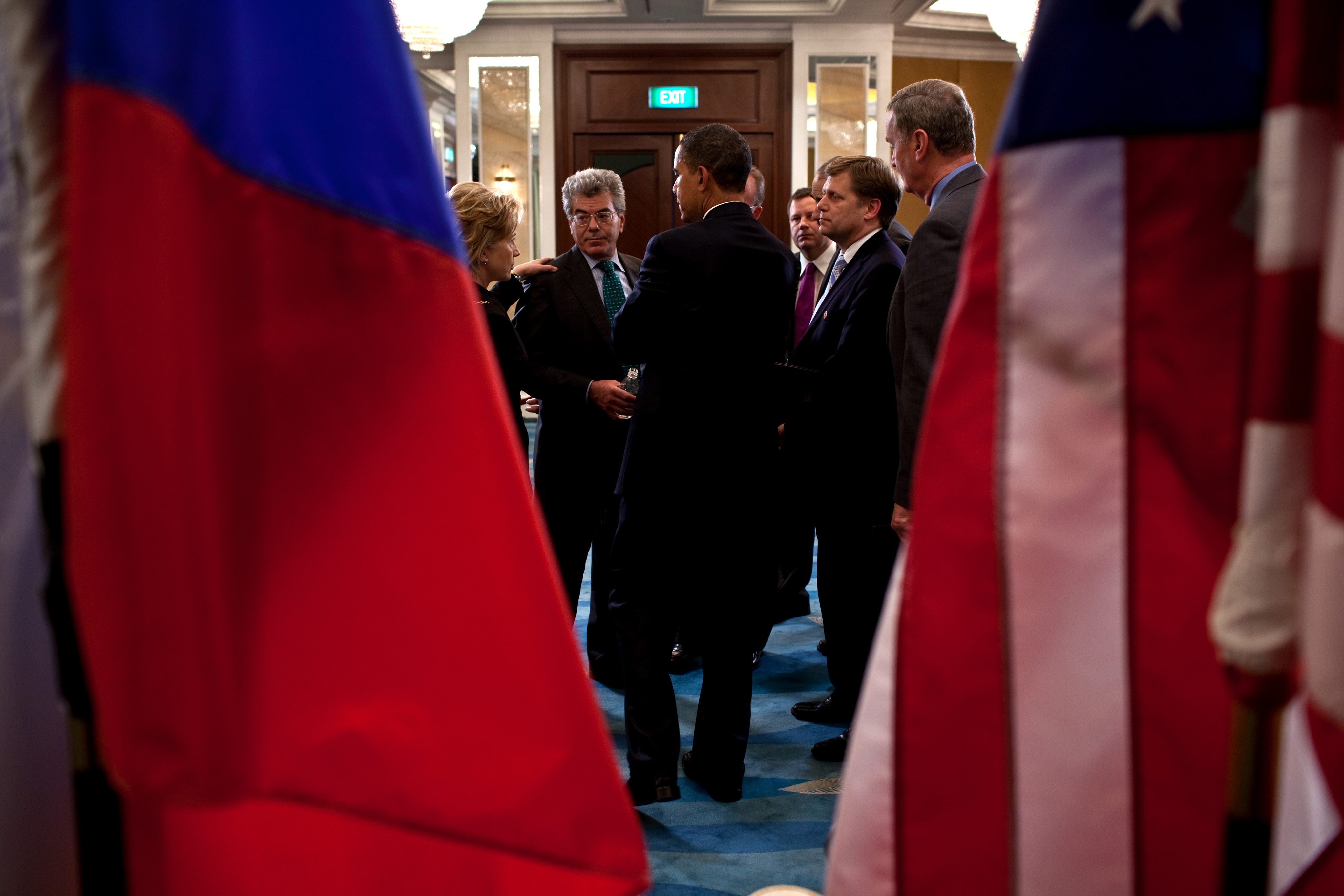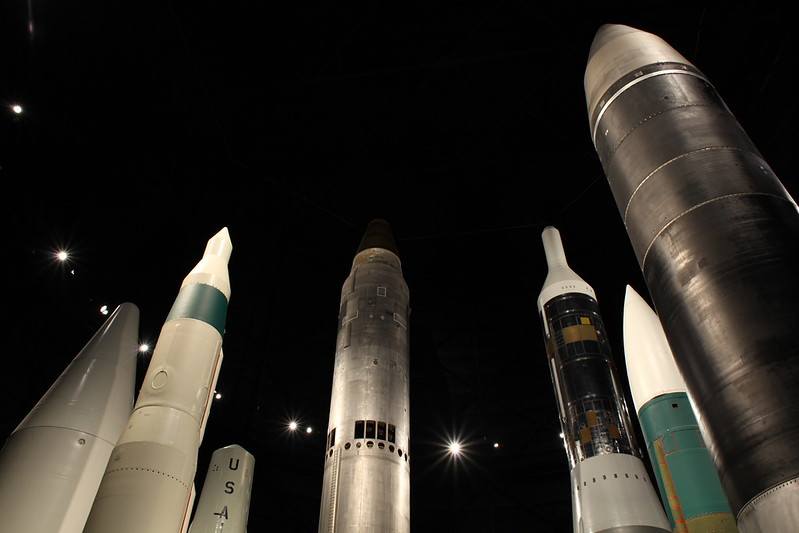Has New START Reached a Dead End?
Russia’s New START violations have raised the risk of breaching its central limits. The political conflict underlying them could bring about the treaty’s end.

In February, the State Department reported that Russia is noncompliant with the monitoring and verification provisions of New START, with implications for its central arms limits. Russia’s violations augur that the last nuclear arms control treaty between the United States and Russia might come to an end.
The United States and Russia signed New START in April 2010, based on “mutual trust, openness, predictability, and cooperation.” The treaty entered into force in February 2011. New START’s central limits constrained strategic offensive forces. Within seven treaty years, New START required mutual arms reductions to 1,550 nuclear warheads, 800 deployed and nondeployed strategic launchers, and within that limit 700 deployed strategic launchers. Both parties achieved these reductions in February 2018.
The treaty designed an intrusive verification regime. It provides for regular on-site inspections, data and notification exchanges, and legal use of national technical means (NTM) of verification (for example, imagery satellites) without interference. New START also established a forum for implementation, the Bilateral Consultative Commission (BCC). As of June 2023, both parties had exchanged over 25,000 notifications under the treaty.
New START was due to expire in February 2021. The Trump administration attempted to renegotiate a treaty to address existing concerns with New START and include China as a party, without success. Within one month of taking office, the Biden administration extended the treaty with Russia for five years, as allowed once by New START.
Russia then reversed course. Its invasion of Ukraine and concomitant failure to comply with New START have raised the risk to U.S. national security interests.
Bringing Politics Back In
In January 2022, Russia joined permanent members of the U.N. Security Council in committing to comply with bilateral arms control, among other nonproliferation obligations. But Russia’s invasion of Ukraine the following month precipitated a series of New START violations.
In August 2022, Russia invoked a temporary exemption from treaty inspections. Moscow claimed that U.S. sanctions against Russia created “unilateral advantages” for the United States. Washington rejects the claim and considers the exemption legally invalid. That November, Russia postponed a planned BCC session in protest over the “full-blown hybrid war unleashed against Russia,” code for U.S. support to Ukraine. That postponement exceeded 45 days of the initially proposed date, as required by the treaty.
Therefore, both actions contravened Russia’s obligations under New START. In January 2023, the State Department first reported that it could not certify Russia’s compliance with the treaty. The following month, Russian President Vladimir Putin announced that Russia is “suspending” its participation in New START.
Putin insisted that suspension was not withdrawal, and Russia’s foreign ministry further stated that suspension can be reversed if the United States “takes honest efforts towards general de-escalation.”
By preserving a legal relationship under the treaty and conditioning Russia’s compliance on U.S. concessions, Russia sought leverage to coerce changes in U.S. policy toward Ukraine. Moscow conveyed that arms control, like war, is a continuation of politics.
In response, the United States suspended biannual data exchanges, notifications, inspections, and telemetry information, beginning in March 2023. The State Department claims these are lawful countermeasures to “induce a breaching state to return to compliance with its international obligations.”
Russia’s Rule Breaking
Russia’s purported suspension of the treaty is legally invalid. Therefore, it does not release Russia from its obligations under New START. As Rose Gottemoeller and Marshall Brown, who negotiated the treaty, explain: “New START has no provision for suspension. What the Russians are doing is not permitted by the treaty.”
Instead, Russia appeals in part to international law to justify its suspension. Russian officials cite a provision of the Vienna Convention on the Law of Treaties, whose Article 62 permits suspension under a “fundamental change of circumstances.” They claim that U.S. support to Ukraine constitutes such fundamental change. It signifies that Moscow will not compartment arms control within the bilateral relationship.
However, Gottemoeller and Brown argue, because U.S. assistance to Ukraine does not affect the basis for or transform the extent of obligations under New START, such suspension is without justification. As the State Department maintains, U.S. support for Ukraine “does not absolve Russia of responsibility to fulfill its legal obligations under New START.”
Russia remains bound by its treaty obligations. According to the State Department’s New START implementation report, Russia has violated at least five treaty provisions.
First, as in 2022, Russia failed to comply with its legal obligation to facilitate inspections under Part Five of the treaty’s protocol, denying the United States its right to conduct inspections under Article XI of the treaty. As before, this failure was on account of “temporary exemption” and, as of February 2023, purportedly suspending the treaty entirely. Second, as in 2022, when Russia postponed a BCC session, Russia rejected a U.S. proposal to convene a session in March 2023 on account of its purported treaty suspension. Russia therefore failed to comply with the obligation to convene no fewer than two BCC sessions each year under Part Six of the treaty’s protocol.
Russia’s purported suspension resulted in new treaty violations in 2023. Third, Russia failed to provide treaty-mandated notifications, as required under Article VII of the treaty and Part Four of the protocol. Fourth, Russia failed to provide biannual data updates also required under Part Four of the protocol. Fifth, Russia failed to discuss the exchange of telemetric data within the BCC, given the absence of a BCC session, as required annually under Article IX of the treaty and Part Seven of the treaty’s protocol. For a second year, then, the United States could not certify Russia’s treaty compliance.
New START and National Interest
Despite Russia’s noncompliance with monitoring and verification, Moscow has indicated that it would observe New START’s central limits. The implementation report assesses that Russia “likely did not exceed the New START Treaty’s deployed warhead limit in 2023.” That suggests more fidelity than last year, when the State Department was “unable to make a determination” about Russia’s compliance with the central limits throughout 2022.
Still, the report acknowledges that Russia’s noncompliance “negatively affects” verification. Absent treaty-provided measures, the United States must rely on NTM to verify Russia’s observance of New START’s central limits. While foundational to verification regimes, these technologies are “less capable” of monitoring warheads than delivery platforms. As a State Department official acknowledged in 2022, the United States does not “know how to do effective verification” on warheads separate from delivery platforms.
Going further, Matthew Costlow has argued that the State Department’s assessment strains credulity. In 2022, Russia was near the New START warhead limit and has since fielded intercontinental ballistic missiles capable of carrying multiple warheads. The United States, it follows, could miss a breach of New START’s central limits.
While Russia is noncompliant with New START—but presumably because Russia is assessed to have not exceeded its central limits—the State Department does not determine that Russia’s noncompliance “threatens the national security interests of the United States,” a determination required by Senate ratification of the treaty.
A positive determination that New START jeopardized U.S. national security would justify withdrawal. But the discordance between the State Department’s compliance assessment and national security determination has drawn scrutiny. As Robert Peters argues: “At best: new START doesn’t benefit American security. At worst: [the State Department] is underplaying the Russian nuclear threat.”
If the United States’s ability to assess Russia’s warheads with high confidence through NTM degrades, then a future determination that New START serves U.S. national security interests would be more difficult.
***
New START is nearing the end for reasons beyond the treaty. In 2009, the Strategic Posture Commission judged that the “moment appears ripe for a renewal of arms control with Russia.” There appeared a “convergence of thinking among U.S. and Russian leaders” to renew arms control and reduce nuclear weapons.
Convergence was momentary. During the war in Ukraine, Russian officials have claimed that the United States seeks to inflict “strategic defeat” on Russia. Arms control is a paradox, Colin Gray argued, because the political conflict that produces arms competition also prevents its resolution through arms control.
At the nadir of bilateral relations, arms control “cannot be taken out of the overall context or considered in isolation.” For Moscow, it is “inseparable from the geopolitical, military and strategic reality.” This belief was behind Russia’s violations of New START and, later, its rebuffing U.S. entreaties to discuss future arms control, even without preconditions. As a National Security Council official said, Moscow’s linking of politics and arms control sets a “pretty high bar.”
After 13 years in force, New START is reaching its end. Russia’s violations have raised the risk of breaching the treaty’s central limits, while the political conflict underlying them could bring that end about.




